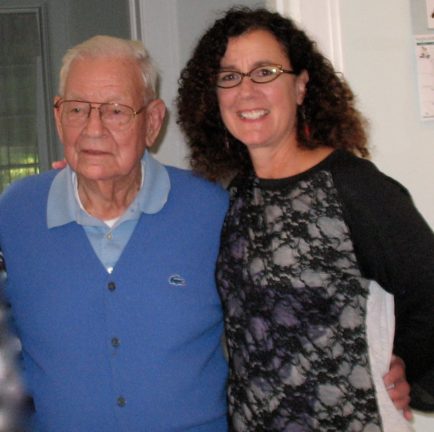 The word father conjures up so many feelings for all of us. Some memories may be good. Others may be bittersweet. As we celebrate Father’s Day it seemed appropriate to reminisce a bit about my father, his elder care needs and my family’s journey as caregivers as we navigated a new reality of geriatric care.
The word father conjures up so many feelings for all of us. Some memories may be good. Others may be bittersweet. As we celebrate Father’s Day it seemed appropriate to reminisce a bit about my father, his elder care needs and my family’s journey as caregivers as we navigated a new reality of geriatric care.
A few years ago, my father, then 92, opened what he thought was a door leading to a bathroom but instead it was a stairwell. The doors were side by side and he was in an unfamiliar home. His first step was a big one and could have been his final step. Thankfully it was not.
He suffered a traumatic brain injury (TBI) with all kinds of complications. As difficult as those final years with our father were, the journey was bittersweet with moments of cognizance and confusion peppering each day. Throughout his career as a civil engineer everything he did necessitated precision. The mental confusion resulting from the brain injury was exhausting and it was tough to watch him try to discern even the simplest things. As he worked to fight through the fog from the injury, we convinced ourselves that perhaps he had Alzheimer’s or dementia. Medical professionals disagreed and said it was truly the TBI and that improvements would come with time. When he seemed to have day and night confused we thought it was “Sundowners,” again the doctors said it was likely dementia caused by the brain trauma.
When he was discharged from the rehab facility we learned firsthand that as a baby boomer caregiving can be a challenge and a blessing all at once.
Once he was home our true discoveries became realities. Homes are not built to accommodate individuals with mobility challenges. We needed a ramp. Doorways were often too narrow for a wheelchair or walker. His bathroom needed to be retrofitted with grab bars and assistive devices for the toilet and shower. A hospital bed had to be ordered. The list and responsibilities went on and on. We watched as our entire family was emotionally disrupted while firmly united for a common cause.
Dad had to learn to walk and feed himself. After the brain injury, he took his unassisted steps approximately two months after thefall. Although 600 miles away, we were sent photos of the milestone from his very thoughtful in-home caregiver. Just like parents watching their infant’s first steps we found ourselves shedding tears of joy although our roles were clearly reversed.
Through his journey, we learned a number of things worth sharing. We learned about caregiving and patience. We learned how psychology plays a part in navigating the manner in which adult children and seniors interact when the children become caregivers for their parents, grandparents or older loved ones.
For daytime interaction and to give our family caregivers a break, we discussed using an adult day services program, however, he was not independent enough to participate. We knew dad would benefit greatly from the interaction with others, but his situation mandated full-time at home geriatric caregivers. We discussed putting him in an assisting living center to help him progress, however, we feared he would not thrive in that environment.
Any type of caregiving can take its toll on the strongest individual and geriatric care can be extremely challenging. Caregivers experience ups and downs. While there is no way to predict all the things that may happen on the road to caregiving, here are ten tips we learned on our journey providing supportive care.
Ten Caregiving Tips
for the Sandwich Generation
- Talk with your loved one about their needs.
- Prepare yourself for the emotional journey of caregiving.
- Allow friends, family members or caregiving professionals to help.
- Learn from the experience of others.
- Prioritize what needs to be done.
- Give yourself grace in the caregiving process.
- Appreciate your strengths and don’t overdo.
- Take breaks for yourself (shopping, reading, taking a break to renew and refresh).
- Keep a notebook to log dates, times and routines. (Ours included a daily sheet to record medicines; vital signs – temperature; blood pressure, sugar levels; etc. It proved very useful for caregiver transitions and when we visited doctors.)
- Celebrate your time together. Time is a precious gift.
Learn more about our Supportive Care and Care Team programs, here. Let our experience serve as a roadmap as you navigate new resources and services to improve your life or that of a loved one.
By Susan Sizemore


